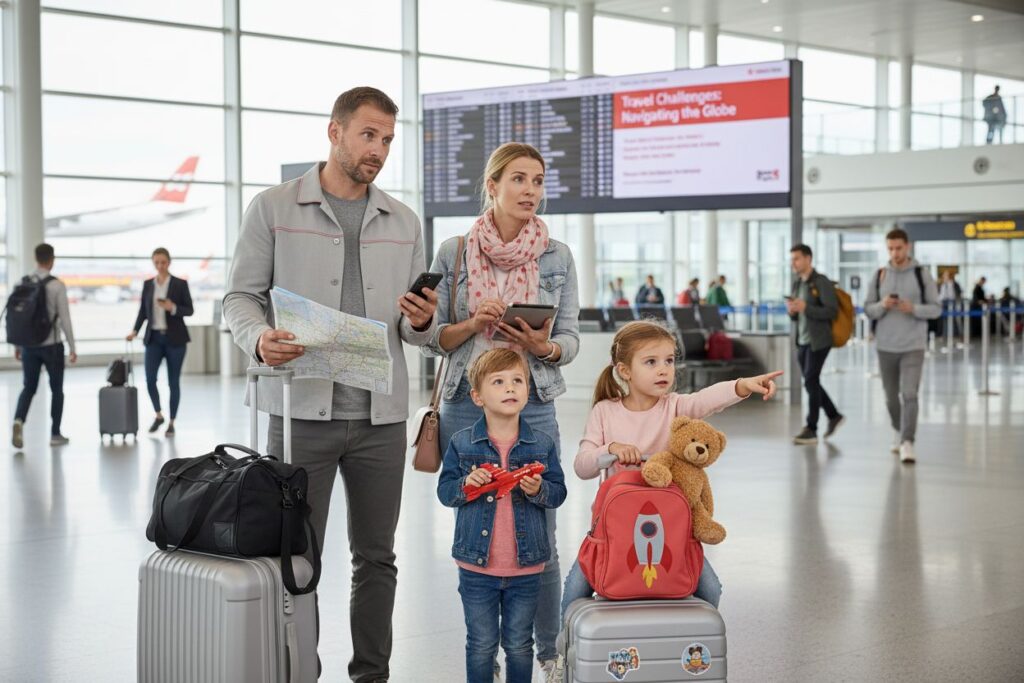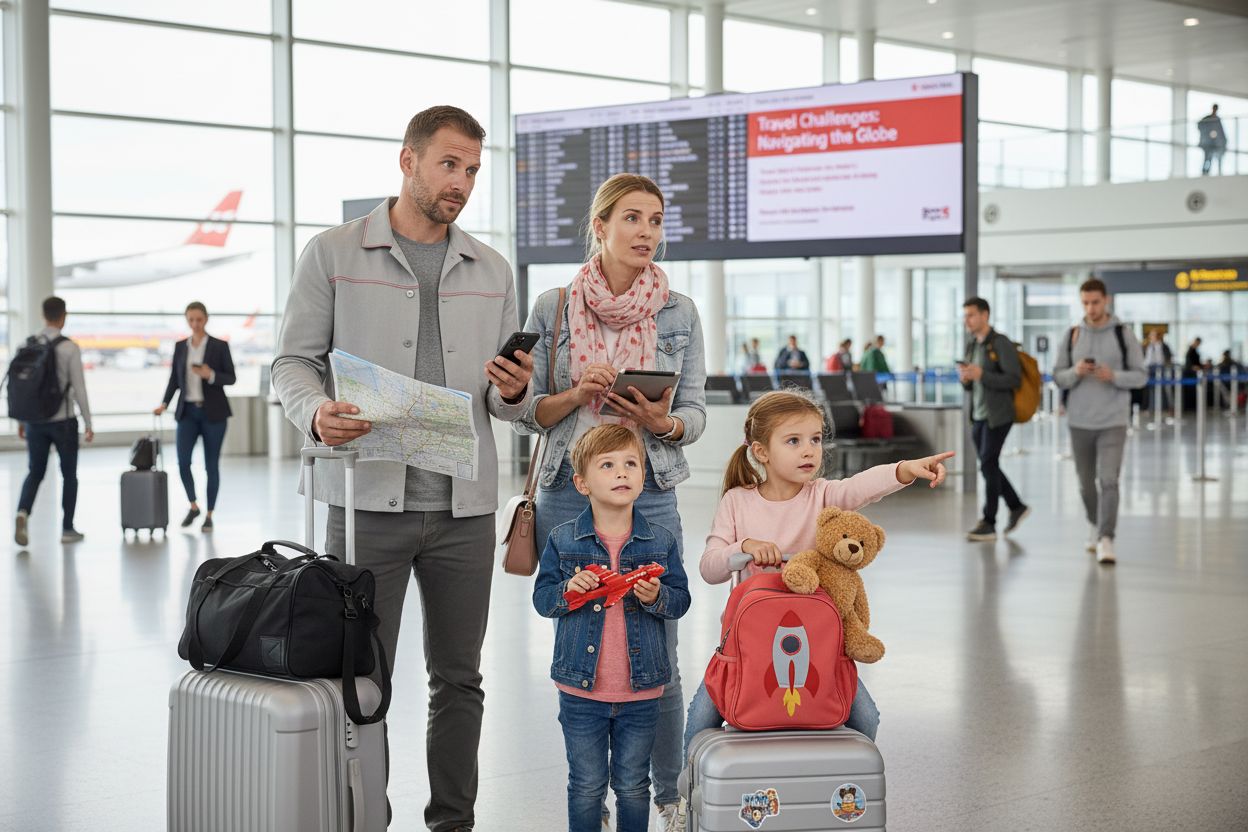Traveling as a family might sound like fun and relaxation, but the reality gets complicated fast. Almost 60 percent of parents say planning a family trip is more stressful than going to work. Surprised? Most people think the hardest part is just keeping the kids entertained, yet the biggest obstacles come from balancing everyone’s needs, managing tight budgets, and keeping peace during unexpected curveballs. The real story behind family travel is about much more than just packing bags.
Table of Contents
- What Are Family Travel Challenges And Their Impact?
- Why Understanding Family Travel Challenges Is Important?
- Key Factors Contributing To Family Travel Challenges
- How Family Travel Challenges Affect Planning And Enjoyment
- Strategies To Overcome Common Family Travel Challenges
Quick Summary
| Takeaway | Explanation |
|---|---|
| Understand diverse family needs | Recognizing varying preferences and expectations reduces travel stress and fosters cooperation. |
| Proactive planning is essential | Anticipating challenges allows better budgeting and decision-making to minimize unexpected issues. |
| Effective communication builds harmony | Involving all family members in planning enhances excitement and aligns expectations for the trip. |
| Flexibility leads to memorable experiences | Adapting to changes during travel transforms potential disruptions into cherished moments. |
| Focus on shared problem-solving | Collaborative approaches to challenges strengthen family bonds and enrich travel narratives. |
What Are Family Travel Challenges and Their Impact?
Family travel presents unique complexities that transform seemingly straightforward trips into intricate logistical endeavors. These challenges extend far beyond simple packing and transportation, encompassing emotional, financial, and interpersonal dimensions that can significantly impact overall travel experiences.
The Psychological Landscape of Family Travel Stress
Traveling with family introduces a complex web of competing needs, interests, and expectations. Research indicates that family travel challenges often stem from coordinating diverse schedules, managing limited budgets, and accommodating varying age groups and individual preferences. Parents frequently find themselves balancing multiple roles simultaneously: travel planner, mediator, caregiver, and entertainer.
The psychological strain can manifest through several key stress points:
- Constant negotiation of family members’ preferences
- Managing unexpected disruptions to planned activities
- Maintaining group harmony while addressing individual needs
- Financial pressure of accommodating multiple travelers
Economic and Emotional Dynamics of Family Travel
Beyond logistical complexities, family travel challenges carry significant economic implications. Each additional traveler exponentially increases trip costs, from transportation and accommodation to meals and entertainment. These financial considerations can create underlying tension and limit travel opportunities for many families.
Moreover, interpersonal dynamics play a crucial role in trip satisfaction.
Studies suggest that unresolved family tensions during travel can potentially diminish overall trip enjoyment and create long-lasting emotional impacts. The key lies in proactive planning, open communication, and flexible expectations.
Strategic Approaches to Mitigating Travel Challenges
Recognizing these challenges is the first step toward creating more enjoyable family travel experiences. Smart travelers understand that successful trips require comprehensive preparation, realistic expectations, and a willingness to adapt. Check out our guide on family vacation planning for comprehensive strategies to transform potential stressors into memorable moments.
By understanding and anticipating family travel challenges, families can develop resilience, strengthen bonds, and create lasting memories that transcend momentary difficulties.
Why Understanding Family Travel Challenges Is Important?
Comprehending family travel challenges transcends mere logistical preparation. It represents a strategic approach to transforming potential stress points into opportunities for meaningful connection, personal growth, and shared experiences that can strengthen family bonds and create lifelong memories.
Psychological Resilience and Family Dynamics
Understanding travel challenges helps families develop critical emotional intelligence and adaptive strategies. Research from the American Psychological Association highlights that families who proactively anticipate and discuss potential travel stressors are more likely to navigate unexpected situations with patience and mutual understanding.
Key psychological benefits include:
- Enhanced communication skills
- Improved conflict resolution abilities
- Increased empathy among family members
- Developing shared problem solving techniques
Economic and Planning Efficiency
Prudent recognition of potential travel challenges enables more strategic financial planning and resource allocation. By identifying potential obstacles in advance, families can:
- Budget more accurately for unexpected expenses
- Select destinations and activities aligned with collective interests
- Minimize financial strain through informed decision making
- Reduce potential sources of travel related stress
Long Term Personal and Familial Growth
Travel challenges are not obstacles but opportunities for personal development. Understanding organizational strategies can transform potentially frustrating experiences into moments of learning, adaptability, and shared adventure. Families who approach travel with curiosity and flexibility often report stronger interpersonal relationships and more resilient family units.
Ultimately, understanding family travel challenges is about recognizing that the journey itself matters more than perfect execution. By embracing potential difficulties with preparation, humor, and collective problem solving, families can turn travel from a potential source of stress into a powerful tool for connection, learning, and creating extraordinary shared narratives.

Key Factors Contributing to Family Travel Challenges
Family travel challenges emerge from a complex interplay of personal, logistical, and environmental factors that can transform seemingly straightforward trips into intricate navigational experiences. Understanding these underlying elements is crucial for developing effective strategies to minimize potential disruptions and maximize travel enjoyment.
Individual and Interpersonal Dynamics
Each family member brings unique expectations, preferences, and emotional needs that can create potential friction during travel. Age differences, individual energy levels, and personal interests significantly impact group travel experiences. Children might have different tolerance levels for long journeys, while adults manage complex logistical considerations simultaneously.
Key interpersonal challenge factors include:
- Varying comfort levels with new environments
- Differing sleep and meal schedules
- Contrasting entertainment preferences
- Individual stress response mechanisms
Logistical and Financial Complexities
Research highlights that unpredictable disruptions represent significant challenges in family travel. Transportation delays, accommodation inconsistencies, and unexpected policy changes can dramatically alter travel experiences. Financial constraints further compound these challenges, requiring meticulous planning and flexible budgeting.
Significant logistical challenge areas encompass:
- Complex transportation coordination
- Limited budget allocation
- Diverse dietary requirements
- Age appropriate activity selection
Environmental and External Factors
External circumstances beyond family control can introduce substantial travel complications. Seasonal variations, destination specific regulations, health considerations, and global events like pandemic restrictions create additional layers of complexity. Check out our family vacation planning guide for comprehensive strategies to navigate these potential obstacles.
Successful family travel demands a holistic approach that acknowledges these multifaceted challenges.
This table summarizes the main types of family travel challenges and gives brief explanations of how each factor impacts the travel experience.
| Factor Category | Description |
|---|---|
| Individual & Interpersonal Dynamics | Unique needs, age differences, and personal interests create potential friction and require careful balancing. |
| Logistical & Financial Complexities | Coordinating transportation, budgeting for expenses, and planning age-appropriate activities demand organization. |
| Environmental & External Factors | Weather, local regulations, health issues, and global events can unpredictably impact trips. |
| By anticipating potential issues and maintaining flexibility, families can transform potential stressors into opportunities for shared growth, understanding, and memorable experiences. |
How Family Travel Challenges Affect Planning and Enjoyment
Family travel challenges do not merely represent isolated obstacles but fundamentally reshape the entire travel planning and experience landscape. These challenges create a cascading effect that influences everything from initial destination selection to post trip emotional reflections, transforming what could be a simple vacation into a complex psychological and logistical journey.
Impact on Pre Travel Planning Dynamics
Before a single ticket is booked, family travel challenges begin influencing planning strategies. Families must navigate a intricate decision making process that balances individual preferences, collective needs, and practical constraints. Research from travel psychology experts reveals that anticipatory stress during planning can significantly diminish initial travel excitement.
Key pre travel planning challenge areas include:
- Negotiating destination selections
- Balancing budget limitations
- Accommodating diverse age group requirements
- Managing conflicting personal interests
Emotional and Psychological Consequences
Travel challenges directly impact the emotional landscape of family trips. Unresolved planning tensions can create underlying stress that permeates the entire travel experience. When families cannot effectively manage these challenges, what should be a bonding opportunity transforms into a potential source of interpersonal conflict and disappointment.
Significant psychological impact factors encompass:
- Increased family tension
- Reduced travel satisfaction
- Potential long term memory associations
- Diminished collective travel enthusiasm
Adaptive Strategies and Resilience Building
Explore our comprehensive trip organization guide to understand how strategic planning can mitigate potential challenges. Successful families recognize that travel difficulties are not insurmountable barriers but opportunities for collective problem solving and mutual understanding.
Ultimately, family travel challenges are less about the specific obstacles encountered and more about the collective approach to navigating unexpected situations. By transforming challenges into collaborative experiences, families can convert potential stressors into moments of growth, connection, and shared adventure.
Strategies to Overcome Common Family Travel Challenges
Successful family travel requires a proactive and strategic approach that anticipates potential obstacles and creates flexible frameworks for managing unexpected situations. By developing comprehensive strategies, families can transform potential stressors into opportunities for connection, learning, and shared adventure.
Communication and Collaborative Planning
Research from family psychology experts demonstrates that early, inclusive communication is crucial in mitigating travel challenges. Involving all family members in the planning process helps distribute responsibility, align expectations, and build collective excitement about the upcoming journey.
Effective collaborative planning strategies include:
- Hosting family planning meetings
- Creating shared digital planning documents
- Allowing each member input on activity selections
- Establishing clear communication protocols
Flexibility and Adaptive Mindset
Adopting a flexible approach is fundamental to navigating family travel challenges. Rigid expectations often lead to disappointment, while adaptable families can transform unexpected disruptions into memorable experiences. Successful travelers understand that imperfect moments frequently become the most cherished memories.
Key adaptive strategies encompass:
- Maintaining realistic expectations
- Building buffer time into itineraries
- Developing contingency plans
- Practicing collective problem solving
Technology and Resource Management
Explore our comprehensive family vacation planning guide to discover innovative tools for streamlining travel preparation. Modern technological solutions offer unprecedented opportunities for coordinating complex family travel logistics, from shared digital itineraries to real time communication platforms.
Ultimately, overcoming family travel challenges is less about eliminating difficulties and more about cultivating a collective mindset of curiosity, patience, and mutual support.
This table compares key strategies families can use to overcome common travel challenges, outlining the core approach and how each method contributes to a better trip.
| Strategy Category | Key Approach | Benefit |
|---|---|---|
| Communication & Collaborative Planning | Involve all members in planning process | Aligns expectations, distributes responsibility |
| Flexibility & Adaptive Mindset | Maintain realistic, adjustable expectations | Turns disruptions into positive, memorable experiences |
| Technology & Resource Management | Use digital tools for organization | Streamlines coordination and reduces logistical confusion |
| By approaching travel as a collaborative adventure, families can transform potential obstacles into opportunities for growth, understanding, and lasting connection. |

Take the Stress Out of Family Travel Planning with Yopki
Traveling as a family should be about making memories, not managing chaos. If the thought of negotiating everyone’s preferences, tracking endless emails, and juggling last-minute changes keeps you up at night, you are not alone. As explored in [Understanding Family Travel Challenges for Fun Trips], the biggest barriers to truly enjoyable family vacations are complicated planning, conflicting schedules, and real-time surprises. These details can drain the fun from your trip and make every decision feel like a chore.

It is time to plan smarter and finally experience what family travel was meant to be. The Yopki all-in-one travel app lets you instantly build a personalized, interactive itinerary for your whole family. Forget about spreadsheets or scattered notes. Visually organize every day, let everyone have a say, and watch your plans update in real time. Discover how tools like our drag-and-drop calendar, smart trip maps, and AI Travel Concierge give you back time and peace of mind. Visit Yopki to see how effortless planning can turn travel challenges into family memories—start your next adventure today.
Frequently Asked Questions
What are the main challenges families face when traveling together?
Family travel challenges include balancing diverse schedules, managing budgets, accommodating different age groups, and addressing individual preferences, which can lead to stress and tension.
How can families effectively communicate during travel planning?
Families can improve communication by hosting planning meetings, creating shared digital documents for itinerary management, and allowing input from all members to align expectations and responsibilities.
What strategies can help reduce stress during family travel?
Flexibility is key—keeping realistic expectations, allowing for buffer time in itineraries, developing contingency plans for unexpected situations, and practicing collective problem-solving can all help minimize stress.
How can families turn travel challenges into positive experiences?
By approaching challenges with curiosity and a collaborative mindset, families can transform difficult situations into opportunities for learning, connection, and creating lasting memories.



